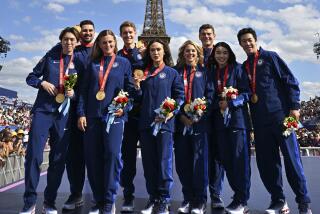Eldredge Earns a Bronze Medal : Figure skating: Two-time U.S. champ jumps from fifth to finish behind Canada’s Browning, Soviet Union’s Petrenko.
- Share via
MUNICH, Germany — With all eyes on quads and the battle for first place, Todd Eldredge sneaked in for a bronze medal Thursday at the World Figure Skating Championships.
The 19-year-old from San Diego moved from fifth to third with a clean program to stand on the podium with Canada’s Kurt Browning and Viktor Petrenko of the Soviet Union.
Browning, who landed the first quad in 1988, scaled down his quad attempt but still won his third straight title.
Elvis Stojko of Canada and Alexei Urmanov of the Soviet Union did successful quadruple toe loops in the competition, and Stojko added a double in combination with his.
Skating last, Eldredge helped the United States have a full complement of men in next year’s Olympics.
“I know someone had to get into the top three to send three to the Olympics,” Eldredge said. “I knew everyone had skated well before me.”
Chris Bowman, the other American with a chance, faltered a bit and was actually in fourth as Eldredge skated.
“I knew there was a little pressure but it’s a good thing I didn’t know about it,” Eldredge said.
Eldredge, a two-time American champion, said he improved after the U.S. meet in February.
“After the nationals I did a lot of work with a ballet instructor,” Eldredge said. “I worked a lot on stamina and tried to show my program better.”
It was enough to push Bowman, of Los Angeles, to fifth after Bowman had been second and third the two previous years. Bowman attempted a quadruple jump but fell.
But Eldredge’s bronze salvaged a third spot for next year’s Olympics.
It also might keep Paul Wylie in skating for one more year.
Wylie, from Denver, came in 11th after the seventh best routine of the evening.
“I desperately want to go to Albertville,” Wylie said.
He said his decision to stay in skating for one more year may hinge on his chances to get to the 1992 Winter Olympics.
“I may be tilting at windmills, but I want another try at the Olympics,” Wylie said.
He came in 10th in the 1988 Games at Calgary.
But his chance may have been gone with the wind because of the new system that eliminated compulsory figures.
“I’ve been a sacrificial lamb in this thing,” Wylie said.
Without the compulsory figures to give a preliminary sorting, the staring order is determined by a random draw and the top skaters can go early.
“Things will be different next year because of this,” he said.
The International Skating Union is discussing a change in the system of random draw for the opening original program and may introduce seedings.
Wylie started first in the opening program and did poorly, getting marks as low as 3.9. He finished 20th to barely qualify for the final free routine.
“It’s like failing a midterm,” said Wylie, who never had a mark lower than C-minus at Harvard. He is a government major. “I had a bad practice this morning because I was still depressed after last night.”
But he returned to the rink in the evening and did a creditable job, landing six of seven triple jumps he tried, including a triple axel which he faltered on the night before.
Heading into today’s free dance, American couples stood ninth and 13th. National champions Elizabeth Punsalan of Sheffield Lake, Ohio, and and Jerod Swallow of Nortville, Mich., are in the top 10. April Sargent of Ogdensburg, N.Y. and Russ Witherby of Cincinnati, are 13th.
More to Read
Go beyond the scoreboard
Get the latest on L.A.'s teams in the daily Sports Report newsletter.
You may occasionally receive promotional content from the Los Angeles Times.






